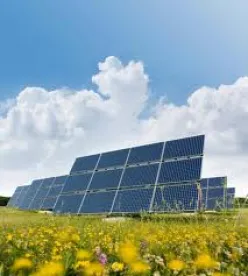Sunny Arizona is again in the middle of a nationwide debate between solar companies and utilities. Legislation adopted in March 2015, and which goes into effect on January 1, 2016, mandate certain disclosures and formats for leases used by rooftop solar companies, such as disclosure of the total lifetime cost of the system and the use of ten point typeface.
Proponents support the new rules as consumer protection legislation. Opponents have viewed the rules as unnecessary and as an additional burden aimed at generating fears and discouraging solar rooftop adoption.
The long-term lease model generally allows for customers to enjoy the benefits of solar power without having to expend substantial sums in setup costs. In a typical long-term solar panel lease arrangement, the homeowner will pay a monthly fee to the solar company to cover the costs of the panels over a relatively long period of time (often, 20 years). The cost of installation and maintenance of the panels is usually incorporated into the monthly payments made by the customer to the solar company. Federal tax credits available to the owner of the solar energy system reduce the cost to consumers.
The new Arizona rules represent a new round in an ongoing contest. Solar installation companies and their supporters intend to bring solar power to the masses via rooftop solar panel installation. Utilities see the widespread adoption of solar rooftop and other distributed generation as a threat to their business models and have argued about the costs and benefits of allowing such programs. The industries have been at odds with respect to how much the utilities should pay for excess power generated by the rooftop systems and over applicable costs and fees for use of the electrical grid.
New Rules
Beginning on January 1, 2016, agreements governing the financing, sale or lease of a distributed energy generation system in Arizona must:
-
Be dated, in at least ten-point type, and signed by the person buying, financing or leasing the distributed energy generation system. Any agreement that contains material blank spaces pertaining to the timing, value or obligations of the agreement, when signed by the customer is voidable at the option of the customer until the system is installed.
-
Include a provision granting the customer the right to rescind the agreement for a period of not less than three business days after the agreement is signed by the customer and before the distributed energy generation system is installed.
-
Provide a description, including the make and model of the distributed energy generation system’s major components or a guarantee concerning energy production output that the distributed energy generation system being sold or leased will provide over the life of the agreement.
-
Separately set forth the following items, if applicable:
-
The total purchase price or total cost to the buyer or lessee under the agreement for the distributed energy generation system over the life of the agreement.
-
Any interest, installation fees, document preparation fees, service fees or other costs to be paid by the customer.
-
If the distributed energy generation system is being financed or leased, the total number of payments, the payment frequency, the amount of the payment expressed in dollars and the payment due date.
-
-
Provide a disclosure in the sale and financing agreements, to the extent they are used by the seller or marketer in determining the purchase price of the agreement, identifying all current tax incentives and rebates or other state or federal incentives for which the customer may be eligible and any conditions or requirements pursuant to the agreement to obtain these tax incentives, rebates or other incentives.
-
Identify the tax obligations that the customer may be required to pay as a result of buying, financing or leasing the distributed energy generation system, including:
-
The assessed value and the property tax assessments associated with the distributed energy generation system calculated in the year the agreement is signed.
-
Transaction privilege taxes that may be assessed against the customer buying or leasing the distributed energy generation system.
-
Any obligation of customer to transfer tax credits or tax incentives of the distributed energy generation system to any other person
-
-
Disclose whether the warranty or maintenance obligations related to the distributed energy generation system may be sold or transferred to a third party.
-
Include a disclosure, the receipt of which must be separately acknowledged by the customer, if a transfer of the sale, lease or financing agreement contains any restrictions pursuant to the agreement on the customer’s ability to modify or transfer ownership of a distributed energy generation system, including whether any modification or transfer is subject to review or approval by a third party. If the modification or transfer of the distributed energy generation system is subject to review or approval by a third party, the agreement must identify the name, address and telephone number of, and provide for updating any change in, the entity responsible for approving the modification or transfer.
-
Include a disclosure, the receipt of which must be separately acknowledged by the customer, if a modification or transfer of ownership of the real property to which the distributed energy generation system is or will be affixed contains any restrictions pursuant to the agreement on the customer’s ability to modify or transfer ownership of the real property to which the distributed energy generation system is installed or affixed, including whether any modification or transfer is subject to review or approval by a third party. If the modification or transfer of the real property to which the distributed energy generation system is affixed or installed is subject to review or approval by a third party, the agreement must identify the name, address and telephone number, and provide for updating any change in, the entity responsible for approving the modification or transfer.
-
Provide a full and accurate summary of the total costs under the agreement for maintaining and operating the distributed energy generation system over the life of the system, including financing, maintenance and construction costs related to the system.
-
If the agreement contains an estimate of the customer’s future utility charges based on projected utility rates after the installation of a distributed energy generation system, the agreement must provide an estimate of the customer’s estimated utility charges during the same period as impacted by potential utility rate changes ranging from at least a five percent (5%) annual decrease to at least a five percent (5%) annual increase from current utility costs. The comparative estimates must be calculated based on the same utility rates.
-
Include a disclosure, the receipt of which must be separately acknowledged by the buyer or lessee, that states:
-
“Utility rates and utility rate structures are subject to change. These changes cannot be accurately predicted. Projected savings from your distributed energy generation system are therefore subject to change. Tax incentives are subject to change or termination by executive, legislative or regulatory action.”
-
The new rules further require the solar companies to disclose the disclose the name, address and telephone number of the person/entity who will be assuming the maintenance or warranty of the distributed energy generation system before the maintenance or warranty obligations of a system under an existing lease, financing or purchase agreement is transferred.
Additionally, if a seller’s or marketer’s marketing materials contain an estimate of the customer’s future utility charges based on projected utility rates after the installation of a distributed energy generation system, the new rules require that the marketing materials contain an estimate of the customer’s estimated utility charges during the same period as impacted by potential utility rate changes ranging from at least a five percent (5%) annual decrease to at least a five percent (5%) annual increase from current utility costs.
The new rules do not apply to those who market, sell, solicit, negotiate, or enter into an agreement for the sale, financing or lease of a distributed energy generation system as part of a transaction involving the sale or transfer of the real property to which the system is or will be affixed.
Due in part to its position in the solar marketplace, the battle over Arizona’s new rules may be a precursor to battles in other jurisdictions.






 />i
/>i

